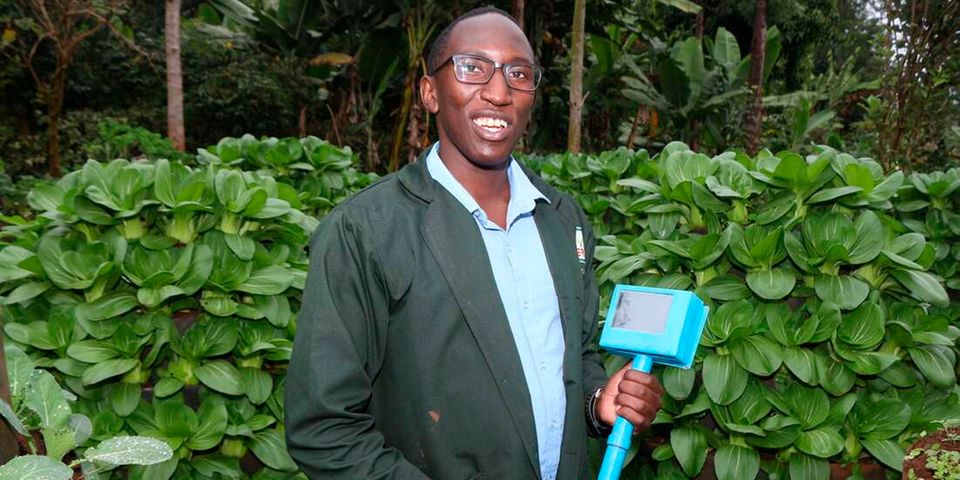Kenya (Kenyatta University) Derrick Ngige’s innovation keeps soils healthy

Kimunyu village in Gatundu South, Kiambu County, is some 45 minutes away from Nairobi city centre.
Most farms in the quiet hamlet located off Kenyatta-Gatundu Road host maize, banana, coffee and tea.
It is an agriculturally rich area that Derrick Ngige, a fifth-year mechanical engineering student at Kenyatta University, has found a perfect place to carry out farm consultancy services.
Seeds of Gold team finds Ngige, who offers soil health services, using an equipment he has developed dubbed Farm Assistant, on Jane Kimari’s farm.
Kimari has 230 storey gardens on an acre hosting strawberries, amaranth, collard greens (sukuma wiki), spring onions, green capsicum and rosemary herbs. She had sought his services through a referral.
The equipment, which Ngige came up with in 2021, consists of a sensory system to detect soil pH, moisture and nutrients in the soil.
It also has a geo –locater to identify the location of the farm.
“To get the readings, the gadget’s sharp end is pushed into the soil to collect samples that are placed on the machine. The readings are then displayed on a screen. They can also be sent on the farmer’s phone via SMS,” explains Ngige.
After getting the results, the innovator, who has taken short courses at the Center for Agriculture and Nutrition, Data Analytical and Innovation(CANDAI) for Policy Impact based at the University of Nairobi Upper, Kabete Campus, then recommends the corrective measures a farmer should take.
“I also work with agronomists to ensure farmers get the help they need.”
So what inspired him to come up with the gadget?
“I was raised in Kinamba, Naivasha where my parents were farmers. I saw them and other farmers struggle to grow crops without knowing the exact nutrients they needed,” he recounts.
Most farmers, according to him, found it expensive to take soil samples to the Kenya Agricultural and Livestock Research Organisation for testing. “Sometimes the extension officers would take the soil samples but return them two seasons later when the soil structure and composition is totally different,” he notes.
Having seen these problems, Ngige says he researched on the gadget he can make to offer farmers an array of services.
“Using my engineering knowledge, I came up with electronic sensory methods that I assembled to offer the service once soil is placed at a certain point,” he explains, noting making the gadget cost him Sh40,000.
He worked closely with his lecturers at the School of Engineering namely Dr Shadrack Mambo and Dr George Kosimbei as well as Prof Kamau Kiringai from the Department of Science Nutrition and Technology, Faculty of Agriculture at the University of Nairobi, to end up with a working equipment.
Prof Kiringai says he supported the technology because it is addressing a gap as well as creating employment.
The Chandaria Business Innovation and Incubation Centre at Kenyatta University assisted him to patent the gadget at Kenya Industrial Property Institute (KIPI) as well as use it to create a business.
The main nutrients Farm Assistant checks in the soil are potassium, nitrogen and phosphorus as well as the pH, temperature and the moisture.
This helps us recommend to farmers the amendments needed to be done, explains Ngige, adding the pH of saline soils is generally below 8.5.
Ngige mainly works with farmers’ co-operatives where he trains their extension officers to administer services to farmers.
The farmers then pay Sh1,400 per acre for the soil services at the end of the season.
According to him, using the services reduce the cost of production by up to 40 per cent.
“A farmer may be for instance buying all sorts of fertilisers, but once soil is tested, he goes for specific nutrients that can even be offered by animal manure.”
On Kimari’s farm, Ngige found the soil salty after years of using saline water from a borehole.
Her production had declined greatly, with a multi-storey garden giving about a kilo of strawberry per month from a week.
Ngige recommended the farmer incorporates chicken and goat manure to reduce the high pH of the soil.
In 2021, he says he served some 17 farmers. And this year, he has so far served 300 farmers.
“I visit most of the farmers on Fridays, Saturdays and Sunday since during the week, I am in school. I also attend field days and farmers’ shows to disseminate the knowledge,” says Ngige, adding his long-term goal is spread his services across the country.
Stephen Mwanza, an agricultural engineer and expert in bio-systems from Jomo Kenyatta University of Agriculture and Technology, says that demand for innovative farm technologies is on the rise due to scarcity of factors of production such as land.
He notes that shifts in temperatures and rainfall are making plants more susceptible to pests and diseases disrupting production.
“Such farming technologies assist in cutting the cost of production and increase revenue by solving farmers’ problems. They help them to build climate resilience.”
